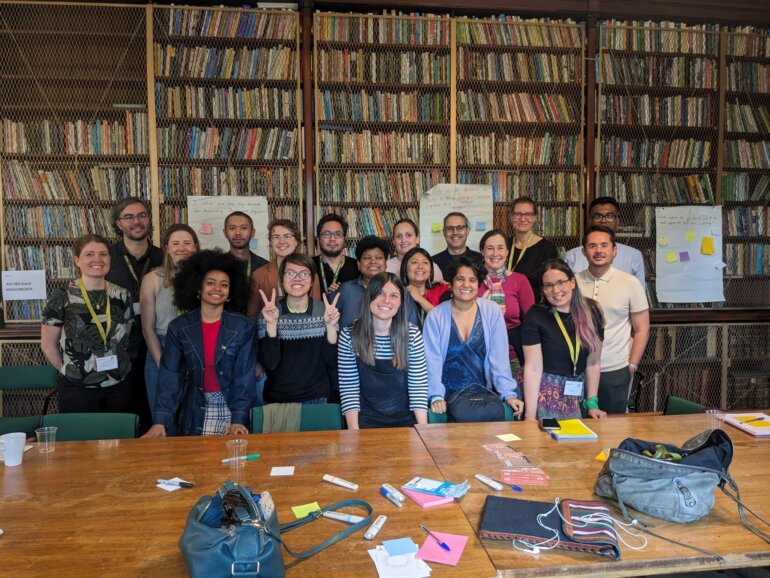Dept of International Development, University of Sussex
Decolonising Development Geographies workshop
In June, Dr Anna Laing (University of Sussex), Dr Sarah Peck (Northumbria University) and Dr Katharina Richter (University of Bristol), in collaboration with the DevGRG research group of the Royal Geographical Society, facilitated a two-day workshop on Decolonising Development Geographies. The workshop featured brilliant talks from Professor Nikita Sud on recolonising the south through energy transitions, Professor Ilan Kapoor on the use and misuse of the decolonisation agenda and Professor Miriam Lang on scrutinizing the north-south boundary from a feminist, decolonial perspective, as well as thought-provoking creative sessions on participatory theatre by Professor Angelo Miramonti and re-imagining research methods through art by PGR researchers. The workshop also featured the UK book launch of The Geopolitics of Green Colonialism: Global Justice and Ecosocial Transitions edited by Miriam Lang, Mary Ann Manahan and Breno Bringel, in conversation with indigenous researcher and activist Josefa Sánchez Contreras of the Zoque people of Chimalapas, Oaxaca, Mexico.
Participants and speakers from around the world, as well as from all career stages, pointed to the specific opportunities a geographical approach might bring to scalar and trans-local understanding of how to decolonise development. But there was also a collective discussion about the dangers of the language of ‘decolonisation’ being re-purposed to centre European knowledge production. The participants will now take forward these discussions into a research output beyond the workshop.

HIV, Gender and the Politics of Medicine:
New monograph released: Mills, Elizabeth., 2024. HIV, Gender and the Politics of Medicine: Embodied Democracy in the Global South. Bristol University Press.
This book centres on women living with HIV in South Africa who have navigated affective relationships, activist networks, government institutions and global coalitions to transform health policies that govern access to HIV medicines. Drawing on 20 years of ethnographic and policy research in South Africa, Brazil and India, it highlights the value of understanding the embodied and political dimensions of health policy and reveals the networked threads that weave women’s precarity into the governance of technologies and the technologies of governance. It illuminates the entwined histories of health policy evolution, systemic inequality and everyday life and calls for a recognition of the embodied ramifications of democratic politics and global health governance. By integrating medical anthropology with science studies and political theory, this book traces the history of the struggle to access HIV medicines in the Global South and brings it into the present by articulating the lessons learned by activists and policy makers engaged in shaping these vital health policies.
Which Children Have Rights?
New article: DeLaet, D., Earp, B. and Mills, E. 2024. “Which Children Have Rights? The Child’s Right to Bodily Integrity and Protection Gaps for Children with Intersex Traits under International and National Laws”. Amicus Curiae 5(3): 448-473.
In this co-authored article, we examine protection gaps for children with intersex traits under international and national laws governing non-voluntary medicalized interventions into sexual anatomy. Various United Nations (UN) bodies, including the UN Special Rapporteur on Torture, the Office of the High Commissioner for Human Rights, human rights treaty-monitoring bodies and the Human Rights Council, have called for full acknowledgment and substantive protection of the rights of children with intersex variations—as with all children—to bodily integrity and (future) bodily autonomy in relation to their own sexed embodiment. However, these global norms generally have not been codified under international law, and most countries have not passed adequate, or any, legislation to secure these rights. We review relevant global norms, international human rights treaties and legislative developments in a range of countries to illustrate potential pathways for closing legal gaps in the protection of all children’s rights to bodily integrity and (future) bodily and sexual autonomy.
